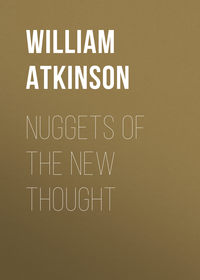
Your Mind and How to Use It: A Manual of Practical Psychology
Theology explains the moral feelings as resulting from conscience, which it holds to be a special faculty of the mind, or soul, divinely given. Science, while admitting the existence of the state of feelings which we call "conscience," denies its supernatural origin, and ascribes it to the result of evolution, heredity, experience, education, and suggestion. Conscience, according to science, is a compound of intellectual and emotional states. Conscience is not an invariable or infallible guide, but depends entirely upon the heredity, education, experience, and environment of the individual. It accompanies the moral and ethical codes of the race, which vary with time and with country. Actions which were thought right a century ago are condemned now; likewise, things condemned a century ago are thought right now. What is commended in Turkey is condemned in England, and vice versa. Moral tastes and ideals, like æsthetic ones, vary with time and country. There is no absolute code which has been always true, in all places. There is an evolution in the ideals of morals and ethics as in everything else, and "conscience" and the moral and ethical emotions accompany the changing ideals.
Many of the moral and ethical principles originally arose from necessity or utility, but have since developed into natural, spontaneous feeling on the part of the race. It is held that the race is rapidly developing a "social conscience" which will cause the wiping out of many social conditions which are now the disgrace of civilization. It is predicted that in time the race will look back upon the existence of poverty in our civilization as our generation now looks back upon the existence of slavery, imprisonment for debt, capital punishment for the theft of a loaf of bread, the killing of prisoners of war, etc. It is thought that, in time, wars of conquest will be deemed as utterly immoral as to-day is regarded the murder of a body of men by a band of pirates or bandits. In the same way the economic slavery of to-day will be seen as immoral as now seems the physical slavery of the past. In not far distant time it will seem incredible that society could have ever allowed one of its members to die of hunger in the streets, or of poverty and inattention in the sick room of the hovel. Not only will the ideals and feelings of ethical and moral responsibility change and evolve, but the feelings of personal sympathy will evolve in accordance therewith. At least such is the dream and prophecy of some of the world's greatest thinkers.
The social, ethical, and moral emotions may be developed by a study of the evolution and meaning of society on the one hand, and the perception of the condition of the lives of less fortunate individuals on the other. The first will awaken new ideas of the history and real meaning of social association and mutual intercourse, and will develop a new sense of responsibility, duty, and civic and social pride. The second will awaken understanding and sympathy, and a desire to do what one can to help those who are "the under dog," and also to bring about a better state of affairs in general. The study of history and civilization, of sociology and civics, will do much in the first direction. The study of human-kind, and its life problems and condition, will do the same in the second case. In both cases there will be awakened a new sense of "right and wrong" – a new conception of "ought and ought not" – regarding one's relations to the race, society, and his fellow beings.
Let no one deceive himself or herself by the smug assumption that the race has entirely emerged from barbarism and is now on the top wave of civilization. The truth, as known to all careful and conscientious thinkers, is that we are but half civilized, if, indeed, that much. Many of our customs and conventions are those of a half-barbarous people. Our ideals are low, our customs often vile. We lack not only high ideals but in many cases we show a lack of sanity in our social conventions. But evolution is moving us slowly ahead. A better day is dawning. The signs are in the air, to be seen by all thoughtful men. Civilization is climbing the ladder, aided by the evolution of the social, ethical, and moral emotions and the development of the intellect.
In connection with this phase of the emotions, we invite the student to consider the following excellent words of Professor Davidson in his "History of Greek Education": "It is not enough for a man to understand the conditions of rational life in his own time. He must likewise love these conditions and hate whatever leads to life of an opposite kind. This is only another way of saying that he must love the good and hate the evil; for the good is simply what conduces to rational or moral life, and the evil simply what leads away from it. It is perfectly obvious, as soon as it is pointed out, that all immoral life is due to a false distribution of affection, which again is often, though by no means always, due to a want of intellectual cultivation. He that attributes to anything a value greater or less than it really possesses, in the order of things, has already placed himself in a false relation to it, and will certainly, when he comes to act with reference to it, act immorally."
CHAPTER XV
The Religious Emotions
BY "the religious emotions" is meant that class of emotional feeling arising from the faith and belief in, or consciousness of the presence of, supernatural beings, powers, entities, or forces. This form of emotion is regarded as distinct from the ethical and moral emotions, although frequently found in connection therewith. Likewise, it is independent of any special form of intellectual belief, for it is far more fundamental and often exists without creed, philosophy, or stated belief, the only manifestation in such cases being a "feeling" of the existence of supernatural beings, forces, and powers to which man has a relation and to which he owes obedience. To those who may think that this is too narrow a conception of religious emotion we refer the following definition of "religion" from the dictionaries: "The acts or feelings which result from the belief of a god, or gods, having superior control over matter, life, or destiny. Religion is subjective, designating the feelings and acts of men which relate to God; theology is objective, denoting the science which investigates the existence, laws, and attributes of God;" or (objectively) "the outer form and embodiment which the inward spirit of a true or a false devotion assumes," (subjectively) "the feeling of veneration with which the worshiper regards the Being he adores."
Darwin, in his "Descent of Man," says that the feeling of religious devotion is a highly complex one, consisting of love, complete submission to an exalted and mysterious superior, a strong sense of dependence, fear, reverence, gratitude, hope for the future, and perhaps other elements. He is of the opinion that no man can experience so complex an emotion until advanced in his intellectual and moral faculties to at least a moderately high level. The authorities generally agree with Darwin, although the more recent study of the history of religion has shown that religious feeling has a far more primitive origin than that indicated by Darwin.
It is true that the lower animals are not deemed capable of anything approaching religious feeling, unless there is a feeling approaching it in the attitude of the dog and horse and other domestic animals toward their masters. But man, as soon as he is able to attribute natural phenomena to a supernatural cause and power, manifests a crude religious feeling and emotion. He begins by believing in, fearing, and worshiping natural forces and objects, such as the sun, the moon, the wind, thunder and lightning, the ocean, rivers, mountains, etc. It is claimed that there is no natural object that has not been deified and worshiped by some people at some time in the history of the race. Later, man acquired the anthropomorphic conception of deities and created many gods in his own image, endowing them with his own attributes, qualities, and characteristics. The mental characteristics and morals of a people can always be ascertained by a knowledge of the average conception of deity held by them. Polytheism, or the belief in many gods, was succeeded by monotheism, or belief in one god.
Monotheism ranges from the crudest conception of a manlike god to the highest conception of a spiritual Being transcending all human qualities, attributes, or characteristics. Man began by believing in many god things, then in many god persons, then in a one god-person, then in one God who is a spirit, then in One Universal Spirit which is God. It is a far cry from the savage, manlike god of old to the conception of the Universal Spirit of the "God-drunken philosopher," Spinoza. The extreme of religious belief is that which holds that "there is nothing but God – all else is illusion," of pantheistic idealism. Buddhism (at least in its original form) discarded the idea of a Supreme Being, and held that Ultimate Reality is but Universal Law; hence the accusation that Buddhism is an "atheistic religion," although it is one of the world's greatest religions, having over 400,000,000 followers.
But the beliefs of the religious person may be considered as resulting from intellectual processes; his religious feelings and emotions arise from another part of his mental being. It is the testimony of the authorities of all religions that religious conviction is an inner experience rather than an intellectual conception. The emotional element is always active in religious manifestations everywhere. The purely intellectual religion is naught but a philosophy. Religion without feeling and emotion is an anomaly. In all true religion there exists a feeling of inner assurance and faith, love, awe, dependence, submission, reverence, gratitude, hope, and perhaps fear. The emotional element must always be present, not necessarily in the form of emotional excess, as in the case of revival hysteria or the dance of the whirling dervishes, but at least in the form of the calm, fervent feeling of "that peace which passeth understanding." When religion departs from the emotional phase it becomes merely a "school of philosophy," or an "ethical culture society."
The student must not lose sight of the uplifting influence of true religious emotion by reason of his knowledge of its lowly origin. Like the lotus, which has its roots in the slimy, filthy mud of the river, and its stem in the muddy, stagnant, and foul waters thereof, but its beautiful flower unfolded in the clear air and facing the sun, so is religious feeling responsible for some of the most beautiful and uplifting ideals and actions of the race. If its origin and history contain much that is not consistent with the highest ideals of the race to-day, it is not the fault of religion but of the race itself. Religion, like all else in the universal manifestation, is under the laws of evolution, growth, and development. What the religion of the future may be, we know not. But the prophets of the race are dreaming visions of a religion as much higher than that of to-day as the latter is higher than the crude fetichism of the savage.
The following quotation from John Fiske's "Through Nature to God" is appropriate in this place. Fiske says: "My aim is to show that 'that other influence,' that inward conviction, the craving for a final cause, the theistic assumption, is itself one of the master facts of the universe, and as much entitled to respect as any fact in physical nature can possibly be. The argument flashed upon me about ten years ago while reading Herbert Spencer's controversy with Frederic Harrison concerning the nature and reality of religion. Because Spencer derived historically the greater part of modern belief in an Unseen World from the savage's primeval world of dreams and ghosts, some of his critics maintained that logical consistency required him to dismiss the modern belief as utterly false; otherwise he would be guilty of seeking to evolve truth from falsehood. 'By no means,' replied Spencer. 'Contrariwise, the ultimate form of the religious consciousness is the final development of a consciousness which at the outset contained a germ of truth obscured by multitudinous errors.'" Fiske, in this connection, quotes the Tennysonian question: —
"'Who forged that other influence,That heat of inward evidence,By which he doubts against the sense?'"The religious emotions may be developed by allowing the mind to dwell upon the Power underlying the universe of fleeting, changing forms; by reading prose and poetry in which an appeal is made to the religious instinct; by listening to music which awakens the emotion of reverence and awe; and, finally, by meditating upon the inner spirit immanent in every living being. As an old Hindu sage once said: "There are many paths by which men arrive at a knowledge of the presence of God, but there is but one goal and destination."
CHAPTER XVI
The Aesthetic Emotions
BY "the æsthetic emotions" is meant those emotional feelings which are concerned with the perception of beauty or taste, and by reason of which we "like" or "dislike" certain perceptions of sensory impressions. In order to get a clearer idea, let us consider what is meant by "beauty" and "taste."
"Beauty" is defined as "that quality or assemblage of qualities in an object which gives the eye or the ear intense pleasure; or that characteristic in an object which gratifies the intellect or moral feeling." "Taste" (in this sense of the term) is defined as "nice perception, or the power of perceiving and relishing excellence in human performances; the power of appreciating the finer qualities of art; the faculty of discerning beauty, order, congruity, proportion, symmetry, or whatever constitutes excellence, particularly in the fine arts or literature; the faculty of the mind by which we both perceive and enjoy whatever is beautiful or sublime in the works of nature and art. The possession of taste insures grace and beauty in the works of an artist, and the avoidance of all that is low or mean. It is as often the result of an innate sense of beauty or propriety as of art education, and no genius can compensate for the want of it. * * * Tastes differ so much among individuals, nations, or in different ages and conditions of civilization that it is utterly impossible to set up a standard of taste applicable to all men and to all stages in the evolution of society."
The æsthetic sense, feeling, and emotion are products of the later stages of the evolution of the mind of man. Their roots, however, may be seen in the crude attempts at decoration and adornment in the savage, and still further back in the tendency of certain birds to adorn their nests or "bowers." Moreover, some sense of beauty must exist in the lower animals, which are influenced thereby in the selection of their mates, the bright plumage of the birds, and the coloring of the insects and higher animals evidencing the existence of at least a primitive æsthetic sense. Herbert Spencer says that one characteristic of the æsthetic feelings is that they are separated from the functions vitally requisite and necessary to sustain life, and it is not until the latter are reasonably well satisfied that the former begin to manifest in force.
The authorities hold that the basic element concerned in the manifestation of the æsthetic emotional feeling is the sensory element, which consists of the pleasure arising from the perception of objects of vision or hearing which are deemed beautiful. There is a certain nervous satisfaction which arises from the perception of the sensation of the sight of a beautiful thing, or of the hearing of beautiful sound. Just why certain sights prove agreeable and others disagreeable, or certain sounds pleasant and others unpleasant, is very difficult to determine. Association and habit may have something to do with the beauty of sight object, and there may be natural harmony of vibration in colors as there is in sound. In the case of sounds there is undoubtedly a natural harmony between the vibrations of certain notes of the scale and inharmony between others. Some have held that the secret of the enjoyment of music is found in the natural appreciation of rhythm, as rhythm is a cosmic manifestation evident in everything from great to small. But these theories do not account for the differences existing in the tastes regarding color and music manifested by different individuals, races, and classes of people.
Grant Allen says: "The vulgar are pleased with great masses of color, especially red, orange, and purple, which give their coarse, nervous organization the requisite stimulus. The refined, with nerves of less caliber, but greater discriminativeness, require delicate combinations of complementaries and prefer neutral tints to the glare of the primary hues. Children and savages love to dress in all the colors of the rainbow." In the same way persons of certain types of taste are pleased with "rag time" and cheap, rollicking songs or dances, while others shudder at these and find delight in the classic productions of the great composers.
There is also the intellectual element to be reckoned with in the æsthetic emotions. The intellect must discover the beauty in certain objects before the emotion is aroused by the perception. Halleck says: "Every time the mind discerns unity amid variety, order, rhythm, proportion, or symmetry, an æsthetic emotion arises. * * * The traveler with a trained intellect will see far more beauty than an ignorant one. In looking at a cathedral, a large part of the æsthetic enjoyment comes from tracing out the symmetry, from comparing part with part. Not until this process is complete will the full beauty of the structure as a whole be perceived. If the traveler knows something of mediæval architecture before starting on his European trip, he will see far more beauty. The opposite of the æsthetic, which we call the ugly, is the unsymmetrical, the disorderly – that in which we can discover no rhythm, plan, or beauty."
The element of associative suggestion also enters into the manifestation of æsthetic emotional feeling. The mind accepts the suggestion of the beauty of certain styles of art, or the excellence of certain classes of music. There are fashions in art and music, as in clothes, and what is thought beautiful to-day may be deemed hideous to-morrow. This is not entirely due to the evolution of taste, for in many cases the old fashions are revived and again deemed beautiful. There is, moreover, the effect of the association of the object of emotion with certain events or persons. This association renders the thing popular, and therefore agreeable and beautiful for the time being. The suggestion in a story will often cause the beauty of a certain scene, or the harmony of a certain piece of music, to dawn upon thousands of persons. Some noted person sets the seal of approval upon a certain picture or musical composition and lo! the multitude calls it beautiful. It must not be supposed, however, that the crowd always counterfeits this sense of beauty and excellence which has been suggested to it. On the contrary, genuine æsthetic feeling often results from the discovery so made.
There is style and fashion in the use of words, resulting from fashion, which gives rise to æsthetic feelings regarding them. These feelings do not arise from the consideration of the nature of the object expressed by the word; of two words designating the same thing, one causes disgust and the other at least passive tolerance. For instance, in speaking of the sensible moisture which is emitted from the pores of the skin, we may use either of the respective terms "sweat" or "perspiration." Both mean the same thing, and have an equally respectable origin. But to many persons the word "sweat" causes unpleasant æsthetic emotion, while the word "perspiration" is accepted without remonstrance. Some persons abhor the term "victuals," while "viands" or "food" are accepted without protest. There is often an unpleasant, low, vulgar association connected with some words which accounts for the disfavor with which they are received, and which association is absent from the more "polite" terms employed to indicate the same thing. But in other cases there is nothing but the simple suggestion of fashion and style to account for the æsthetic acceptance or rejection.
It is possible that some psychologist of the future will establish the truth of the theory now tentatively advanced by a few investigators, namely, that taste and the sense of beauty depend almost entirely upon the element of suggestion, manifested as association, influence of authority, habit, fashion, imitation, etc. It is known that the emotional nature is peculiarly liable to suggestion, and that tastes may be created or destroyed by repeated suggestion under the most favorable circumstances. It is thought likely that if we could trace back to its roots every emotion of taste, we would find it arising from some associative, suggestive influence connected with another and more elemental class of emotions.
Regarding the fact that there is no universal standard of taste or beauty, Halleck says: "It has been said that æsthetics cannot be treated in a scientific way because there is no standard of taste. 'De gustibus non est disputandum' ('there is no disputing about tastes') is an old proverb. Of two equally intelligent persons, the one may like a certain book, the other dislike it. * * * While it is true that the standard of taste is a varying one within certain limits, it is no more so than that of morals. As men's nervous systems, education, and associations differ, we may scientifically conclude that their tastes must differ. The greater the uniformity in the factors the less does the product vary. On the other hand, within certain limits, the standard of æsthetics is relatively uniform. It is fixed by the majority of intelligent people of any age and country. To estimate the standard by which to judge of the correctness of language or of the literary taste of any era, we examine the conversations of the best speakers, the works of the standard writers."
The æsthetic emotions may be developed and cultivated by exercise and practice, and particularly by association and familiarity with beautiful things, and with those who have "good taste." Appreciation of beauty is more or less contagious, up to a certain point of development, at least, and if one wishes to recognize, understand, and appreciate beauty, he should go where beauty is, and where its votaries are gathered. The study of standard works of art, or objects of nature, or the best productions of the composers of music, will do much to develop and unfold one's higher æsthetic feelings and understanding.
It is claimed by some of the best authorities that to develop the finer and higher æsthetic feelings and understanding we must learn to find beauty and excellence in things removed from ourselves or our selfish interests. The narrow, selfish emotions kill the æsthetic feelings – the two cannot exist together. The person whose thoughts are centered on himself or herself very rarely finds beauty or excellence in works of art or music. Grant Allen well sums up the subject in the following words: "Good taste is the progressive product of progressing fineness and discrimination in the nerves, educated attention, high and noble emotional constitution, and increasing intellectual faculties."
CHAPTER XVII
The Intellectual Emotions
BY "the intellectual emotions" is meant that class of emotional feeling resulting from the presence of objects of intellectual interest. This class of emotions depends for its satisfaction upon the exercise of the intellectual faculties, from the most simple to the most complex, and including perception, memory, imagination, reason, judgment, and all the logical faculties. Those who are accustomed to employing the mind through voluntary attention, particularly in the direction of creative ideation or constructive imagination, experience these emotions to a greater or less degree.
The exercise of perception, if we are skilled therein, gives us a pleasurable feeling, and if we succeed in making an interesting or important discovery by reason thereof, we experience a strong degree of emotional satisfaction. Likewise, we experience agreeable feelings when we are able to remember distinctly something which might well have been forgotten, or when we succeed in recalling something which had escaped our memory for the moment. In the same way the exercise of the imagination is a source of great pleasure in many cases in the direction of writing, planning, inventing, or other creative processes, or even in the building of air castles. The exercise of the logical faculties gives great pleasure to those in whom these faculties are well developed.









